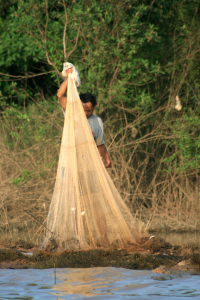Interdisciplinary research finds inland fisheries are a key component to enhancing the UN Sustainable Development Goals (SDGs). Researchers, including doctoral candidate Gretchen Stokes (UF/IFAS School of Natural Resources and Environment), found inland fishery services are largely absent from the SDGs. These economic, social, and ecological services provide food for billions and livelihoods for millions of people worldwide.
“Inland fish services are integral for ecosystem function and biodiversity conservation as well as human livelihoods and well-being,” Stokes said. “The lack of recognition prompted us to investigate how integrating these services could enhance the SDGs.”
UN Goals

The UN SDGs comprise 17 global goals and 169 targets designed as a “blueprint to achieve a better and more sustainable future for all.” The role of freshwater ecosystems and inland fisheries in achieving the goals are only referred to in a few targets.
“Excluding inland fish, fisheries, and key habitats also poses a sustainability problem,” Stokes said. “If they are ignored as a solution, prioritizing or enhancing those services are overlooked as well.”
Research
The team examined the relationships between inland fish, sustainable fisheries, and functioning freshwater systems and the targets of the SDGs. The goal was to highlight synergies across the SDGs that can be achieved with the inclusion of these overlooked inland fishery services. The team identified nine services from inland fisheries and examined how each could contribute to the targets of the SDGs. For the analysis, scientists individually scored the nine inland fishery services for each of the 169 targets of the SDGs. They assessed the contribution of each inland fishery service to the achievement of a target as either strongly positive, positive, weak, or negligible. Each service was also designated as positive or negative.
Their assessment of more than 1,500 relationships revealed that inland fishery services substantially contribute to food security, poverty alleviation, livelihoods, human well-being, and ecosystem function. Positive relationships pertained to five SDG goals: No Poverty (SDG 1), Zero Hunger (SDG 2), Clean Water and Sanitation (SDG 6), Responsible Consumption and Production (SDG 12), and Life on Land (SDG 15). Further, two distinct groups emerged from these relationships between SDGs and inland fishery services. These are well-being services and systems inland fishery service. The clusters can aid governments and development organizations in strategizing their actions toward desired outcomes.
Learn More
The findings appear in the journal Nature Sustainability. You can read the full article here. You can read the authors’ “Behind the Paper” blog here. In addition to the School of Natural Resources and Environment, the research team includes members from the U.S. Geological Survey, National Museum of Natural History, Ohio State University, University of Portsmouth, Fisheries Conservation Foundation, Conservation International, Shedd Aquarium, and the University of Washington.
 0
0
